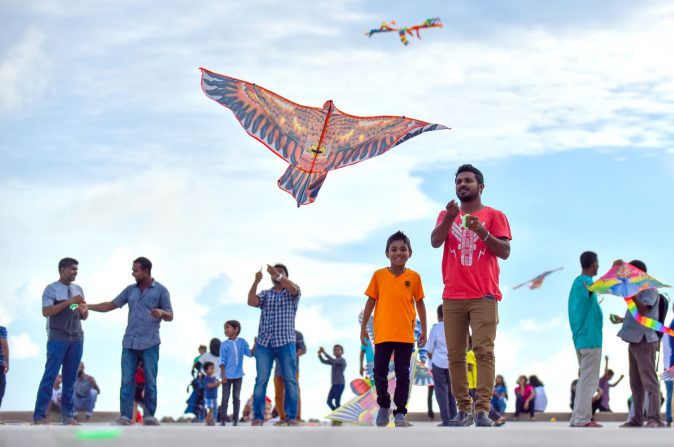Economy / Maldives
Enabling growth, preserving paradise
By 2054, half of all Maldivians could be living in Malé, an immense challenge for the future of this young country.

BY: CAROLINE VIEIRA LIMA
caroline@the-businessreport.com
TThere is no place like the Maldives, with its perfect islands and peaceful lagoons, where manta rays, turtles and gentle sharks slip by in silent procession. There, all is order and beauty, pleasure, peace and luxury, as Beaudelaire once dreamed. However, this postcard picture soon vanishes when one visits the crowded and busy capital of Malé.
Truth is, most tourists never set foot in Malé, or meet any local Maldivians. In the world of the “one island, one resort” concept that has come to define tourism experiences in the Maldives, most visitors step from the airplane to an
airport lounge, where they sip coffee and tea until they are chaperoned to a speed boat to be transferred to their resorts. Fortunately, today, an emerging type of tourist accommodation, defined by guesthouses on local islands amidst resident Maldivians, is allowing visitors to experience Maldivian culture in a different way. In the hundreds of such businesses that have sprawled all across the territory, visitors can experience the rich traditions and beliefs of this island nation, made of modern, sociable and welcoming people.
In many ways, a simple afternoon walk through Malé is enough to understand that this youthful nation has little in common with the image of radical Islam that Western communities have learned to fear. Through its crowded streets,
women drive scooters, own businesses and socialize freely. People of all walks of life gather together to discuss politics or sports in the myriad of busy cafes that populate the streets of the capital.
With nearly 50 percent of the population below the age of 25, Maldivians have grown increasingly connected with the outside world. Years of extensive scholarship programmes have produced the most educated generation in the country’s history, driven by fashion, social concerns and a desire for a globalized lifestyle. They consume a monthly average of 6.5GB of data per person, which places the country well among the top worldwide. Twitter, Instagram and Facebook are preferred communication platforms for a generation of millennials much like any other in the world.
Then and now
The many opportunities that this generation has enjoyed and much of what it still wants to achieve came with, and now lies in, the tourism industry. The coral reefs and sand beaches, so desired by tourists, brought unprecedented wealth to the country and are bound to continue to do so as over a hundred new resorts and many more guesthouses are currently under development.
However, this development also came with a serious environmental threat. Construction and dredging for development of infrastructure for these resorts is responsible for shifting the movement of sands, destroying reefs and disturbing the delicate balance of ecosystems. Beyond the resorts themselves, reclaiming land for urban center expansion, as seen in the development of the Hulhumalé island, adds on to the pressure on the environment.
Waste management is another threat. With 1.4 million tourists to a population of 450,000 (as of 2018), visitors and the resorts where they stay are, by far, the biggest producers of waste in the country, a considerable part of which ends up in the ocean.
The government has put in place ambitious waste management and renewable energy projects, as well as strict environmental policies, in a bid to minimize some of these issues. It is a balancing act that the government and
the people must pursue, a balance between the need to reclaim land for residential and tourism purposes in order to
grow, and the protection of the fragile environment that assures their survival.
There are few other options for progress. The country’s geography, dispersed in small portions of land through hundreds of kilometers of ocean water, makes economies of scale impossible and industries uncompetitive. Nearly all consumer items must be imported. Further, the Maldives, as the world’s flattest and lowest nation, averaging 1.5 meters above sea water, remains one of the regions most threatened by climate change and sea-level rise, a fact local leaders are painfully aware of.
Tourism is one of Maldives’ only opportunities to provide its vibrant youth with better living standards and opportunities, so the country must find solutions to develop the industry in unison with the ecosystem around
it. The tourists that enjoy these habitats also have a part to play in helping to preserve it through their choices of consumption. Today, there are plenty of options to choose environmentally-conscious resorts and hotels, which have invested in reducing waste and follow strict eco-friendly practices.
At the same time, the needs of this vibrant youth also represent important business opportunities for investors. For those that can find solutions for the challenges facing the Maldives, through technology, innovation and cooperation, there is great potential for success. Further, these solutions will greatly contribute to support the Maldives in balancing its desire for economic growth and its need to protect this unique and beautiful nature, fitting of a Baudelaire poem.
